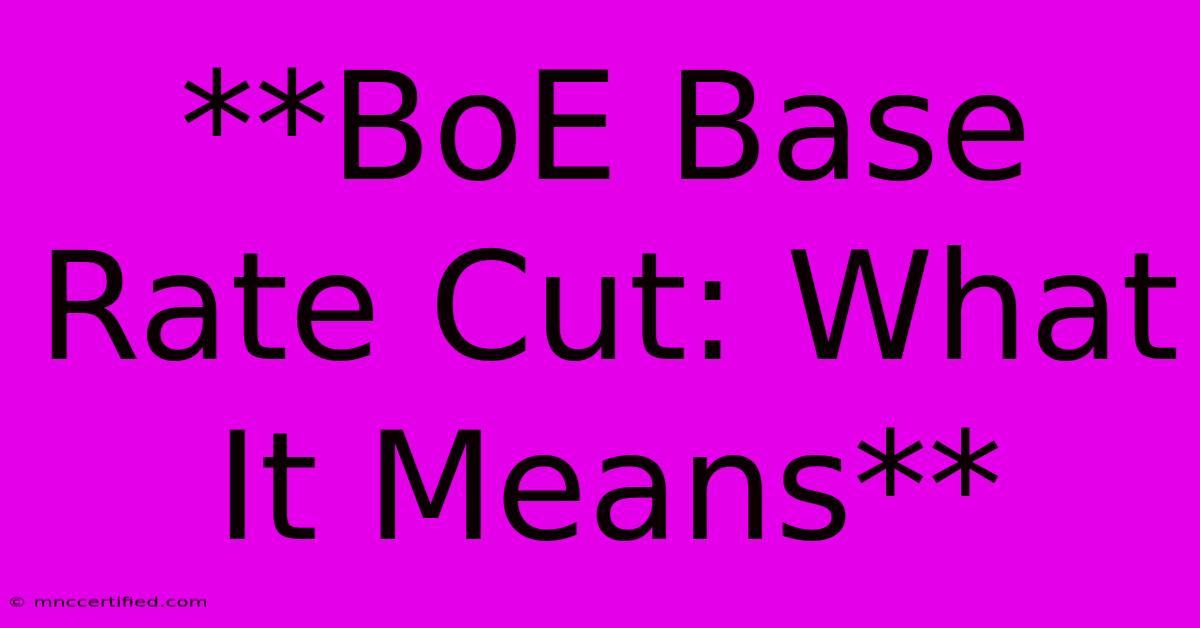**BoE Base Rate Cut: What It Means**

Table of Contents
BoE Base Rate Cut: What It Means for You
The Bank of England (BoE) recently announced a cut to its base interest rate, a move that has significant implications for borrowers, savers, and the overall economy. This article will break down the BoE base rate cut, explaining what it means for you and how it could impact your finances.
What is the BoE Base Rate?
The BoE base rate is the interest rate at which the Bank of England lends money to commercial banks. This rate acts as a benchmark for other interest rates in the economy, including mortgage rates, savings account interest rates, and business loan rates.
Why Did the BoE Cut the Base Rate?
The BoE's decision to lower the base rate is usually driven by a desire to stimulate the economy. When the base rate is cut, it becomes cheaper for banks to borrow money from the BoE. This, in turn, encourages banks to lower their lending rates, making it more affordable for individuals and businesses to borrow money. Lower borrowing costs can lead to increased spending and investment, ultimately boosting economic growth.
What Does This Mean for You?
For Borrowers:
- Lower mortgage rates: A lower base rate can lead to lower mortgage rates, meaning you'll pay less interest on your home loan. This could result in lower monthly repayments and potentially save you significant money over the life of your mortgage.
- Cheaper loans: Reduced interest rates can also make personal loans, business loans, and credit card interest rates more attractive. This can free up more cash flow for borrowers and encourage spending.
For Savers:
- Lower savings account interest rates: Unfortunately, a base rate cut usually translates to lower interest rates on your savings accounts. This means you'll earn less interest on your savings, potentially affecting your overall returns.
For the Economy:
- Stimulated economic growth: The BoE hopes that a lower base rate will encourage borrowing and spending, leading to increased economic activity and job creation.
- Potential for inflation: While a lower base rate can stimulate the economy, it can also contribute to inflation. With more money in circulation, prices for goods and services can rise.
What Should You Do?
- Review your mortgage: If you have a variable-rate mortgage, contact your lender to discuss the possibility of a lower rate.
- Compare savings rates: Shop around for the best savings account rates, as interest rates may vary between different providers.
- Monitor your finances: Keep an eye on your expenses and budget carefully, especially if your interest rates are affected.
In conclusion, the BoE's decision to cut the base rate is a complex issue with both positive and negative implications. It's important to understand how this change might affect your personal finances and to take appropriate steps to manage your money wisely.

Thank you for visiting our website wich cover about **BoE Base Rate Cut: What It Means**. We hope the information provided has been useful to you. Feel free to contact us if you have any questions or need further assistance. See you next time and dont miss to bookmark.
Featured Posts
-
Trump Win Late Night Hosts React See Kimmel
Nov 08, 2024
-
Late Night Trump Victory Jimmy Kimmel Responds
Nov 08, 2024
-
Does Car Insurance Cover Key Replacement
Nov 08, 2024
-
New Partnership Fc Barcelona And Codorniu
Nov 08, 2024
-
Providence Direct Life Insurance Reviews
Nov 08, 2024